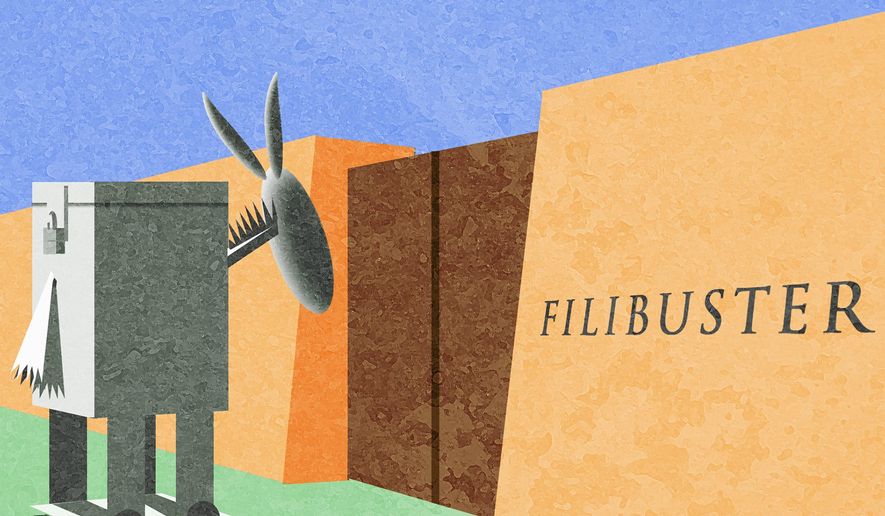OPINION:
Since Vice President Kamala Harris became the Democratic presidential nominee, she has disclosed only a handful of carefully poll-tested public-policy positions. She floated what is perhaps her most consequential idea last week.
“I think we should eliminate the filibuster for Roe and get us to the point where 51 votes would be what we need to actually put back in law the protections for reproductive freedom and for the ability of every person and every woman to make decisions about their own body and not have their government tell them what to do,” she said on Wisconsin Public Radio.
This isn’t a surprising position for someone who, before her elevation to the vice presidency, was the Senate’s most liberal member. But the position demonstrates a lack of forethought.
The filibuster is a procedure that protects the minority party in the upper chamber of Congress. One long-winded senator can tie up Senate business for as long as he or she keeps talking. For most — but not all — matters, 60 votes are needed to silence the dissenting lawmaker, bringing that filibuster to a close.
In practice, this means senators need to find 10 extra votes to advance contentious bills, which requires reaching across the aisle to strike a compromise. If Americans want to see big changes, their votes can send one party to Washington with a filibuster-proof majority.
Given the narrowly divided results of the past several elections, the public doesn’t want to see wild policy shifts right now. Polls suggest Americans have a slight preference for divided government, dysfunctional though it may be.
Democrats burned themselves in 2013 when they decided to ignore this observation. Then-Majority Leader Harry Reid, Nevada Democrat, deployed the “nuclear option” so President Barack Obama could staff the executive branch with divisive nominees on a simple, party-line vote. Regret took hold four years later when the GOP-led Senate used that precedent to clear then-President Donald Trump’s picks to fill three Supreme Court openings.
Such reversals of fortune are inevitable. Democrats might win the White House in November only to lose control of the Senate and executive branch as voters come to recognize the consequences of voting blue. The same procedural trick Democrats would use to pass extreme legislation on abortion could just as easily be used in a subsequent administration to implement what Ms. Harris calls the “radical MAGA agenda.”
The filibuster is nothing more than a tool, neither good nor bad in itself. Tradition speaks to its purpose of serving as a procedural safeguard in our constitutional republic.
Democrats insist the filibuster is nothing more than a Civil War relic created to preserve slavery. Their version of history omits that it was Democrats who went to war to stop Republicans from freeing the slaves.
Senators have used the tactic from our nation’s earliest days. In 1789, one senator complained about his Virginia colleagues who used the chamber’s rules to “talk away the time, so that we could not get the bill passed.” It may not have been called a filibuster back then, but the effect was the same.
Sometimes, not passing bills is the best outcome. As a 19th-century judge observed in a legal case, “no man’s life, liberty or property are safe while the Legislature is in session.” Preserving the filibuster slows down Congress, and that’s good for liberty.




Please read our comment policy before commenting.